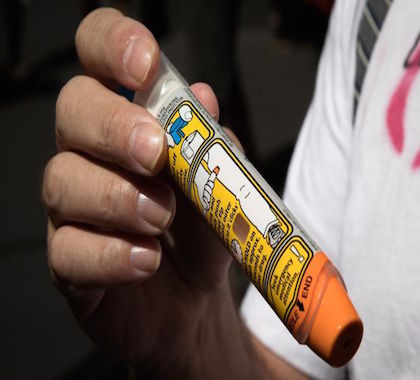The epinephrine auto-injector, also known as the EpiPen, has dominated the market for years, but high prices and limited supply have paved the way for new vendors to arise. Epinephrine counters life-threatening allergic reactions. Injectors vary as to dose and design.
EpiPen seller Mylan’s initial series of patents on the autoinjector were approved in 1987 with an expiration date of 2025. The company now sells a generic version alongside one other generic on the market.
Increasing Competition
Wayne Winegarden, a senior fellow in business and economics at the Pacific Research Institute, says the generic version of EpiPen will add much-needed competition to the marketplace for epinephrine injection.
“You can never have too many options,” said Winegarden. “It’s obviously a very good thing to have more competition in the generic space.” Winegarden also says drug companies often use their patents to hold a monopoly on the market until their investment into the production of a drug becomes profitable, but says the monopoly should end there. “Once that cost is recouped, you want the marketplace to be as competitive as possible,” Winegarden said. “To have more competition, that’s the way the process is supposed to work.”
Shortages and Higher Costs
Mylan garnered media attention early this year when the cost of a pair of EpiPens rose from $94 to $608. Many place the blame for high health care costs on prescription drugs, but Winegarden says there are several other factors that drive up health care costs.
“Drugs are in the news but the issue is total health care spending,” Winegarden said. “Health insurance should be there to manage risks so that when you have a really expensive drug you need or a really expensive surgery or team therapy, those are the financial risks insurance are supposed to cover.”
Winegarden added that adding generics to the market is still a step in the right direction, although it will not solve the problem entirely. “Adding in new competition is the exact right thing to be doing,” Winegarden continued. “It could be this is enough competition and they drive down the price enough that no [other maker] is going to enter [as a competitor].”
Innovation Fuels Competition
Ed Hudgins, research director at The Heartland Institute, which publishes Health Care News, says that drug makers’ approaches to making generic drugs could fuel innovation in the marketplace, adding competition and leading to lower costs.
“More is better in the marketplace,” Hudgins said. “If you keep the market free from regulation, it means lower risk to drug makers looking to compete, and more incentive for them to try. And more competitors is better for the consumer because those drug makers will fight to be not only the best but to bring the product to the consumer at a lower cost to beat their competitor. Addressing the shortage has several advantages in the case of the EpiPen.”
Cost/Benefit
Winegarden says it’s important to remember that the cost of health care should be proportional to how effective it is.
“What matters most overall is how expenditures on health care compare to the quality of health care,” Winegarden said. “Our expenditures in health care can be increasing, but if we’re curing diseases it could be worthwhile.”




